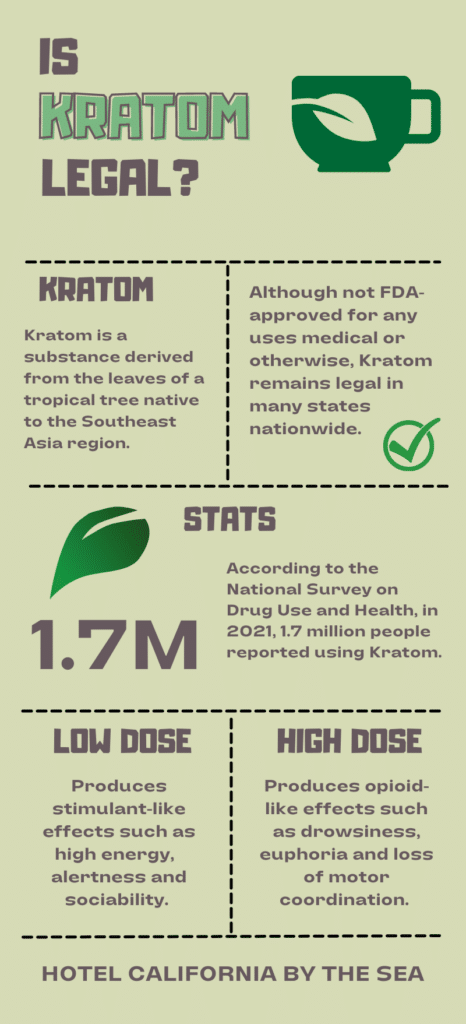Is Kratom legal in Ohio?
Is Kratom legal in Ohio? Kratom is a substance often labeled as an “herbal supplement.” It has been around for years and is used to treat a number of conditions. According to the Substance Abuse and Mental Health Services Administration’s National Survey on Drug Use and Health, in 2021 an estimated 1.7 million Americans reported using Kratom.
Economists are estimating that the Kratom industry in the U.S. is worth 1.3 billion dollars. Although not FDA-approved for any uses medical or otherwise, Kratom remains legal in many states nationwide, including Ohio.
U.S. law prohibits selling Kratom as a drug, dietary supplement, or food additive. This is because there is limited research and data about Kratom. The FDA has continued to issue warnings for Kratom use stating it has no medical benefits. Kratom use can cause adverse side effects such as liver conditions, seizures, and even substance use disorder.
A 2014 study found that over half of Kratom users developed physical and mental dependence. Despite the warnings, millions of Americans continue to use Kratom for various purposes.

Kratom is derived from the leaves of a tropical tree native to the Southeast Asia region. The leaves are dried, brewed into teas, or milled into a fine powder. Many people favor the fine powder form, and most consider it the most legally accepted option.
People in Southeast Asia have used Kratom for centuries to self-treat various conditions. It can treat conditions like pain, coughing, diarrhea, and even opioid use disorder and withdrawal.
Kratom contains two main chemical compounds: mitragynine and 7-OH-mitragynine. Both of these ingredients bind to the mu opioid receptors. These receptors affect chemical systems of the brain such as serotonin and dopamine.
Kratom can produce stimulant-like effects in low doses. This includes high energy, alertness, and excessive speech. It can even help alleviate symptoms of depression and anxiety.
In higher doses, Kratom can produce opioid-like effects. This includes drowsiness, euphoria, calmness and loss of motor coordination. This can often lead to addiction and overdose.
This herbal substance has potentially addictive properties and can cause the following side effects when used:
- Hallucinations and delusions
- Mental confusion
- Nausea
- Itchiness
- Dry mouth
- Sweating
- Loss of appetite
- Increased urination and constipation

The Legality of Kratom in Ohio
Because Kratom has not been FDA-approved for any uses, there are currently no federal regulations surrounding the substance. Because of that, each state has its own regulations and expectations of Kratom. Kratom is banned in Alabama, Alaska, Indiana, Vermont, Rhode Island, Wisconsin, Washington D.C. and a few other major cities in the U.S.
Despite being legal in many parts of the U.S., there are some restrictions on Kratom processing and purchasing. The FDA has not officially approved Kratom, so manufacturers cannot label it as “safe for human consumption”. Manufacturers cannot legally label Kratom products as “infused.” Only pure Kratom powder holds full legal status, so “consumable” forms of Kratom may raise legal questions.
Unregulated substances can pose a potential danger to consumers. Consumers often are not informed of where the Kratom comes from, what it’s mixed with, or how it’s processed. Individuals may not know what they are ingesting or whether it could be harmful or potentially life-threatening.
Kratom in Ohio is widely available and unregulated. The state has attempted to ban the substance in the past but was unsuccessful in the process. Because of the uncertainty around Kratom, state agencies have started creating rules to help protect consumers.
Lawmakers are considering introducing legislation such as House Bill 236, also known as the Kratom Consumer Protection Act. The bill aims to guarantee the purity of Kratom powder sold by Ohio retailers. It would require the Ohio State Department of Agriculture to set standards for Kratom processing and selling by:
- Monitoring and regulating the processing of Kratom
- Creating mandatory licenses for processors of Kratom
- Establishing criminal penalties for violators
- Inspection of any place or area Kratom is being processed, distributed or sold
The bill would also help guard against vendors adding unknown ingredients to Kratom. It would then prohibit the State Board of Pharmacy from listing Kratom as a controlled substance. If passed, it would explicitly prohibit the Ohio Board of Pharmacy from regulating Kratom as a controlled substance.
According to the Ohio Board of Pharmacy, Kratom has traits that may lead to substance abuse. Users can build a tolerance and experience withdrawal symptoms. These risks have raised concerns about its safety. As a result, Ohio has seen several efforts to ban or regulate Kratom.
Check Your Insurance Coverage for FREE
Find out if your insurance covers addiction treatment in minutes. We accept most insurance!
Timeline of events to keep Kratom legal in Ohio
- In March 2019, the Ohio Board of Pharmacy voted on Senate Bill 239. This bill aimed to reclassify Kratom as a Schedule I substance. This would put Kratom in the same category as drugs such as cocaine, heroin, and other “hard” substances.
- The American Kratom Associated began working to overturn this decision. In August of 2019, they were able to successfully delay any official ruling.
- In that same month, lawmakers introduced House Bill 318 to establish regulations for Kratom sales and purchases in Ohio. This law would set the minimum age to purchase Kratom at 18. All Kratom products would have to have a clear label listing their ingredients. Vendors would be required to apply for a special license to sell Kratom, and must lab test their products before offering them to consumers.
- In March 2022, House Bill 236 was also introduced to help establish a detailed guideline for Kratom sale, purchase and possession. This bill required the Ohio Department of Agriculture to form a program responsible for monitoring the processing and sale of the herbal substance. This included creating a special license to obtain Kratom, an established procedure for testing and compliance of products, a set of labeling standards, and procedures and requirements for product transportation.
Reach out to Hotel California by the Sea
We specialize in treating addiction and other co-occurring disorders, such as PTSD. Our Admissions specialists are available to walk you through the best options for treating your addiction.
Today, there is no official ban on Kratom. An estimated 10 billion Americans use Kratom for varying purposes. But there is still little scientific research and data available on the substance.
Kratom in powder form seems to be the most accepted form of the substance that has not caused legality troubles for sellers and buyers. Between 2016 and 2018 in Ohio, the Department of Health linked about 15 accidental overdose deaths to Kratom.
When used in high doses, Kratom can begin to mimic the same effects as an opioid. This leads users to develop an opioid-like addiction. Once users develop physical and mental dependence, they may face withdrawal symptoms when they try to stop using Kratom. Treatment centers like Hotel California by the Sea offer specialized programs for people with substance use disorders.
Our Kratom addiction rehab program offers detox, residential treatment, PHP and IOP programs. Throughout each level of care, clients receive evidence-based treatments and the expertise of a clinical rehab facility. Specialized treatment methods such as CBT, DBT and family therapy help clients understand any co-occurring mental health conditions they may have in addition to their substance use disorder. Hotel California by the Sea provides personalized care plans to help clients recover from Kratom or other substance addictions.
References:
https://www.fda.gov/news-events/public-health-focus/fda-and-kratom
https://www.bicyclehealth.com/blog/kratom-statistics-legality-by-state
https://kratomspot.com/is-kratom-legal-in-ohio-2
https://toptreeherbs.com/is-kratom-legal-in-ohio/
https://www.npr.org/2023/07/08/1186514144/kratom-herbal-supplement-lawsuits-deaths-fda
